- Home
- Claudia Mills
Zero Tolerance Page 9
Zero Tolerance Read online
Page 9
“You haven’t even walked in the door yet,” her mother replied.
Outside the main building—the only way Sierra could tell it was the main building was by the small sign bearing the word OFFICE—two older boys with longish hair stood loitering.
“They need haircuts,” Sierra said.
“Oh, some kids just want to be a little different. They don’t want to cross every t and dot every i.”
Sierra liked crossing t’s and dotting i ’s.
Or she used to.
Inside the main building, the walls were filled with student artwork—vividly colored self-portraits. Full-grown trees in terra-cotta pots stretched toward the ceiling skylight.
The secretary in the front office was a young woman who looked barely old enough to be out of college, dressed in blue jeans and a loose, embroidered cotton top. Her frizzy hair was even wilder than Sierra’s mother’s.
“Nice to see you again,” the secretary said. “I’ll let Jackie know you and your daughter are here.”
Jackie turned out to be the principal, who at least had on a dress rather than jeans, but a flowing African-patterned dress that didn’t seem to Sierra like what a principal would wear.
“Welcome to Beautiful Mountain, Sierra,” Jackie said with a warm, crinkly smile. Jackie’s close-cropped gray hair set off her long, dangling earrings.
Does she know about me? Does she know what happened to me?
“Your mother told me that you love the arts,” Jackie said. “And that you’re a strong student leader at Longwood Middle School.”
Sierra didn’t know if she was a strong student leader. “I’m in Leadership Club.”
“Well, here we love students who take initiative,” Jackie said. “We value student ideas enormously. But one difference you’ll find at Beautiful Mountain is that, while we have a lot of student leaders, we don’t have many student followers.” She laughed in a friendly way.
Then her tone changed. “I’m sorry for what you’re going through right now,” she said softly. “It must be very difficult.”
Sierra was torn between gratitude for Jackie’s genuine-sounding sympathy and a desire, however paradoxical, to defend her school.
“Don’t you have rules here?” she asked. The question came out sounding more hostile than she had intended.
“Of course we do. Human beings couldn’t live together without rules. Our students themselves play a big role in shaping those rules.”
Jackie put her arm around Sierra’s shoulders. It might have felt presumptuous or intrusive, but it didn’t.
“But, Sierra, no student would ever get expelled from Beautiful Mountain for trying to do the right thing. I can promise you that.”
Even as her eyes pricked with tears, Sierra tried to defend Mr. Besser one more time. It was strange, but defending Mr. Besser was almost like defending her father, too. They both thought Longwood Middle School was vastly better than some “progressive” alternative.
“So students can bring knives to school here and nothing happens?”
“Nothing happens,” Jackie said gently, “if someone brings a knife to school by mistake.”
As Jackie led Sierra and her mother on a mini-tour of Beautiful Mountain, Sierra noticed that the classrooms were ridiculously small—ten desks!—and that the library for the entire school had hardly more books in it than Sierra’s book-crammed house. Yes, there was art everywhere, but the Longwood Middle School art teacher was terrific, too—Sierra thought again of her poor, abandoned pot. And would any choir from Beautiful Mountain be chosen from schools all around the state to perform at the big music educators’ convention?
But part of Sierra remembered the frizzy-haired secretary greeting her with a friendly “Hey.”
Part of Sierra remembered the warmth of Jackie’s comforting arm around her shoulders.
“So what did you think?” her mother asked her as they got in the car to drive away.
Sierra gazed out the car window at the falling January darkness. “It was okay.”
25
Halfway through Tuesday morning, Sierra had to admit it: she missed Luke Bishop. She read Anne Frank while Julio and Brad played on their Game Boys, careful to hold them hidden on their laps under the table. The three of them had no interaction aside from an initial hello as the boys wandered in, separately, a few minutes after the tardy bell.
Mrs. Saunders escorted them to lunch at the start of 4A.
“Did your son’s wisdom teeth surgery turn out okay?” Sierra asked her.
“Aren’t you sweet to ask,” Mrs. Saunders said. “It was fine, though I think he’s already tired of Jello and vanilla pudding.”
Julio followed behind them, saying nothing; Brad had brought his lunch from home. They both had three-day suspensions, so their suspensions would end tomorrow.
Only Sierra had done something so unforgivable that her suspension would last forever.
Today Colin was obviously scanning the lunch line, looking for her. As soon as she picked up her tray of macaroni-and-beef casserole, canned corn, canned pears, and small carton of milk, he came over to talk to her.
“Did you hear?” he asked, his gray eyes fastened on hers.
“Is it about the choir trip?”
“Three of us told Mr. Lydgate that we won’t go if you can’t go, and if we don’t go, there’s no way the choir can perform. Counting you, that’s half the choir.”
Sierra looked down at her tray, abashed. Colin was her knight in shining armor—a soft-spoken, not very tall knight whose long-tapered fingers had a slight tremor—charging off to the Crusades with her banner flying above him.
“I heard Besser is furious,” Colin continued. “Mr. Lydgate told us Besser wants to come talk to us at our rehearsal on Thursday morning, the last rehearsal before the trip, if there is a trip, to convince us to go.”
“What about Mr. Lydgate? Is he upset, too?”
“He’s one of the teachers who signed the petition. He hates zero tolerance. So I think he’s jazzed that we’re doing this. But he’ll be bummed if the choir doesn’t go, because it’s this huge feather in his cap as a music teacher if we do go. So I think he’s hoping that Besser will back down so you can go and we all can go. But if Besser doesn’t back down, I think he hopes we’ll give in and end the boycott.”
Sierra could hardly make herself ask the next thrilling question, but she did.
“Will you back down?” She met Colin’s earnest gaze, wishing her eyes were wide and intense like his.
“Not a chance.”
Mrs. Saunders, who had been standing a short distance away, interrupted. “We need to be getting back, Sierra.”
“Who else is doing the boycott with you?” Sierra had to ask before leaving the cafeteria.
“Jeremy and Alicia.”
Sierra would have bet a million dollars, if she had a million dollars, that it wouldn’t be Celeste.
“Wow. Thanks,” Sierra said.
“You don’t need to thank me,” Colin said.
Her heart sang as she floated back to the suspension room.
Will you back down?
Not a chance.
* * *
It was another afternoon without reporters, further proof that Sierra’s imminent expulsion was yesterday’s news. It was another afternoon without Em, Lexi, and Celeste, too: they all had a Leadership Club meeting after school.
Her father was home when she and her mother came in from the garage to the kitchen. Sometimes, especially after a big case ended, he worked from home. Right now he had his laptop set up on the kitchen table, catching up on e-mail as he listened to classical music on the public radio station.
He stood up to kiss Sierra’s mother on the mouth and to give Sierra a quick hard hug. Sierra hung up her coat and dropped down into the chair next to him as her mother put on the kettle for tea.
“How’s my brave girl? Still sticking it out with the cretins and the criminals?”
“Gerald!” her
mother chided him. “Just because kids are assigned to an in-school suspension doesn’t mean that they’re dumb or bad. You of all people should know that right now.”
“I wasn’t talking about the kids in suspension,” he said. “I was talking about the school administrators who put them there.”
He laughed, but Sierra’s mother didn’t laugh with him.
“I don’t even like the word ‘cretin.’ It’s derogatory. It’s hurtful to people who have developmental challenges.”
“Now, don’t go all politically correct on me,” he said, his tone affectionate, like Luke’s yesterday, calling Sierra a suck-up and an ass kisser.
The phone rang. No one bothered to get up to answer it. It was probably just some reporter who still hadn’t given up on the same-old, same-old story.
“You have reached the Shepard residence,” said her mother’s voice on the tape. “Please leave a message at the tone.”
After the beep, a woman’s voice spoke.
“This is Jackie DuChamp at Beautiful Mountain. I just want to thank you and Sierra for taking the time to stop by yesterday, and see if you had any further questions I could answer for you.”
Halfway through the message, Sierra’s father stood up from his chair and was over by the phone mounted on the far wall, his eyes narrow with anger. Sierra hoped he wouldn’t pick up the phone and tell Jackie what he thought about artsy-fartsy schools for fruits and nuts who didn’t know how to think.
He let the message finish. Then he turned his furious gaze on Sierra’s mother.
“What was that?”
Sierra was impressed as her mother raised her chin and kept her own gaze steady. “I told you I wanted to stop by just to take a look.”
“And I told you to forget about it. I’m not having my daughter throw away a first-class education at the most rigorous school in the district for some touchy-feely hippie nonsense.”
Now her mother’s eyes flashed with her own anger. “For your information, Gerald, when I visited Beautiful Mountain I came away very impressed. There is more creativity in one single classroom in that school than in all of Longwood Middle School put together.”
“Creativity?” Her father made it sound like a dirty word. “You want me to pay twenty thousand dollars a year for creativity? Call me strange, call me old-fashioned, but I want Sierra to go to a school where she actually learns something.”
“And what is she learning where she is now? Obey every rule, however idiotic, however inane, and if you break a rule in complete and total innocence, you may have your life destroyed? That’s what you want her to learn?”
Sierra had never seen her parents fight this way before. She shrank back in her chair, willing herself to disappear.
“No one’s life is going to be destroyed,” her father said. “Sierra is going to learn that you can fight for your rights. Do you want her to learn that if your rights are threatened, you just run away to the happy, feel-good flower children and make beaded necklaces and macramé sandals all day?”
“Do you know any way to respond to other people’s ideas and opinions without being insulting and demeaning?” her mother shot back.
“Not if the ideas are ludicrous, I don’t.”
“So my ideas are ludicrous?”
Sierra’s father pounded the palm of his open hand against his forehead; he was obviously trying to pull himself together.
“No,” he said. “I don’t think your ideas are ludicrous. But this one—all right, you’re making me say it—this one is.”
“Because this school values creativity. Well, guess what? You married someone who is creative. You married a playwright.”
Don’t, Sierra beamed the word toward her father. But she was powerless to stop him.
“A playwright who is pretty darned lucky to be married to an attorney. To someone who actually makes money. Uncreative as that is, it does come in handy every once in a while. Like when there’s the small matter of a mortgage to pay. Or to get a few uncreative things like heat, and electricity, and running water. How far do you think you’d get with your creative hobby if it weren’t for your uncreative husband—”
He broke off midsentence, but it was too late. His wife was covering her mouth as if she might be sick.
“Look, I didn’t mean it that way. I respect your work, you know I do.”
She cut him off. “My hobby. My pitiful plays that never get produced and that don’t make any money. You respect them.”
“Honey.”
He came over to where she was sitting and stooped down to try to put his arm around her shaking shoulders.
“Get away from me. Don’t touch me.”
Stung by her rebuff, he straightened himself to his full standing position, rage rekindled in his eyes.
“None of this would have happened, none of it, if you had respected my opinions and done what I said.”
“What you said,” she repeated. “Well, Gerald Edward Shepard, Esquire, after fifteen years a person can get just a wee bit tired of always doing what you say.”
She snatched up her purse, which had been draped over the back of one of the kitchen chairs, and fumbled for her car keys. Without even bothering to grab her coat, she fled from the kitchen to the garage. Sierra heard the garage door open and the car engine start.
“She’ll be back,” her father said, as much to himself as to Sierra.
Sierra buried her face in her hands and began to cry.
26
By six-thirty Sierra’s mother still hadn’t returned.
Sierra’s father knocked on her bedroom door; Sierra was in bed, under the covers, reading Anne Frank, wishing the story could end with Anne Frank still alive.
“I guess we’d better go get some dinner,” he said.
The refrigerator was full of food they could have heated up, but her father already had his car keys in his hand.
They drove to an Indian restaurant that had a buffet not just for lunch but for dinner, too. Sierra was glad not to have the awkwardness of waiting to order their food and then waiting for it to arrive. It was easier to talk once they were already settled with plates of sag paneer and aloo gobi for her and lamb curry and tandoori chicken for her father.
“Your mother gets that way,” he said. “But she’s one of those people who get angry quickly and then get over it quickly. One thing she doesn’t do is bear a grudge.”
Unlike you?
Sierra pulled off a piece of the soft puffy naan bread and let it dissolve in her mouth.
“How did you and Mom meet?” she asked. She already knew the answer, but wanted to hear how her father would describe it.
He chuckled. “Even back then she was writing plays. So I guess you could say I knew what I was signing up for from minute one. I had never cared for plays, but my roommate dragged me to this one because he had gone out a couple of times with the girl who wrote it. I remember on the way there all I could think was, I hope it’s not a musical.”
“So you went to one of Mom’s plays,” Sierra prompted.
He nodded and took a forkful of lamb curry before going on.
“There must have been twenty people in the audience, tops, so it’s good we were there to fill two more empty seats.”
“Was the play good? Was it funny?”
He chuckled again. “Good? Now, that’s a loaded question, honey. No, it wasn’t good, if by ‘good’ you mean ready for Broadway. But you could say it had a big heart. Even the villain in the play—the main character’s father, who wasn’t going to let his daughter marry the man she loved—turned out to be a decent guy after all. Your mother has a gift for seeing the best in everybody. You have that, too. Me? I have the gift for seeing people as they are.”
“You didn’t say if it was funny.”
“Well, it was supposed to be. Some people in the audience were laughing at some of the better lines, but with such a small audience, it’s hard.”
“So did you laugh?”
“Well, t
here was one spot—the actor had just delivered a line that you could tell he thought was pretty hilarious. And then, I don’t think anyone else saw it, but I could see that he realized that his fly was partway open, and he tried to do it up casually so no one would see. I pretty much lost it there, laughing. But it was good for the performance. It loosened up the rest of the audience, and then they were more willing to laugh at whatever happened next. The contagion effect.”
Sierra ripped off another piece of bread and rolled it into a small hard ball between her fingers.
“Does Mom know? That you didn’t really think her play was funny, but that you just thought it was funny that one of the actors had his pants unzipped?”
“Of course not. Sierra, I would never do or say anything, intentionally, to hurt you or your mother. You understand that? That hobby stuff I said before—I never would have said that if I hadn’t been provoked.”
He took a long swig from his glass of water.
“Look. Your mother had no right to go traipsing over to look at that school, not after I had expressly said I didn’t want her doing that.”
Sierra waited to see if he would ask her what she thought of Beautiful Mountain. If he did, she wasn’t sure what she would say. But he didn’t.
“Honey, you’re too smart for a place like that. You may see the good in people, like your mother, but you have a lot of me in you, too. You’d see through that kumbaya scene in ten minutes, I know you would.”
The waiter came by to refill their water glasses, and her father asked for the check.
When they got home, at quarter to eight, Sierra’s mother’s car was in the garage, but she was already in bed. Or at least she was in the bedroom with the door closed and the lights off.
27
The next morning, Sierra’s father had already left for work by the time she came downstairs for breakfast at seven o’clock, but he often went in early, so she didn’t know if her parents had made up their quarrel or not. Maybe Sierra would be expelled and have a broken home like Luke’s, all in one week.

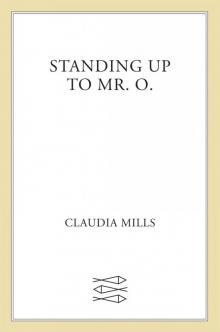 Standing Up to Mr. O.
Standing Up to Mr. O.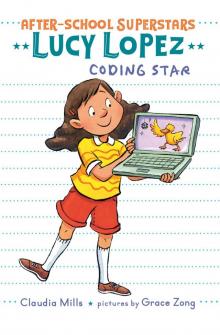 Lucy Lopez
Lucy Lopez Dinah Forever
Dinah Forever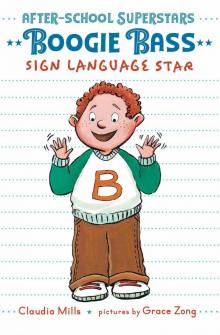 Boogie Bass, Sign Language Star
Boogie Bass, Sign Language Star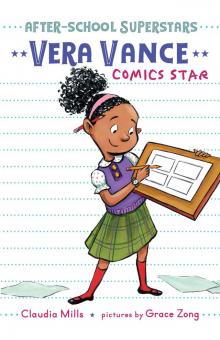 Vera Vance: Comics Star
Vera Vance: Comics Star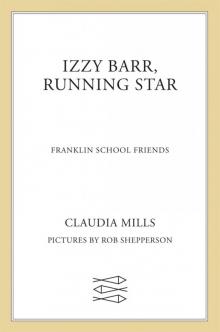 Izzy Barr, Running Star
Izzy Barr, Running Star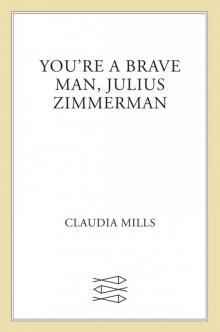 You're a Brave Man, Julius Zimmerman
You're a Brave Man, Julius Zimmerman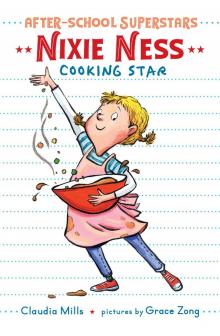 Nixie Ness
Nixie Ness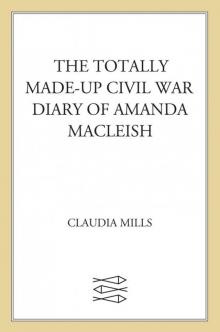 The Totally Made-up Civil War Diary of Amanda MacLeish
The Totally Made-up Civil War Diary of Amanda MacLeish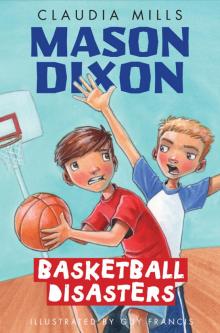 Basketball Disasters
Basketball Disasters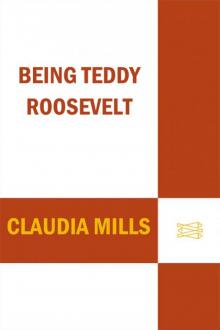 Being Teddy Roosevelt
Being Teddy Roosevelt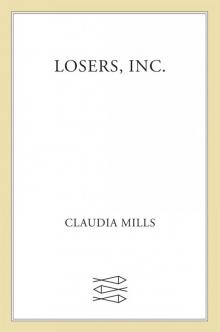 Losers, Inc.
Losers, Inc.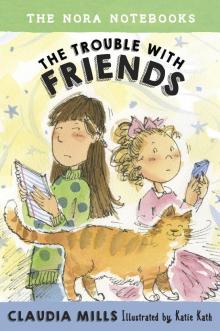 The Trouble with Friends
The Trouble with Friends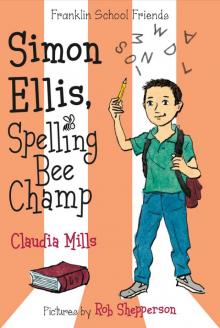 Simon Ellis, Spelling Bee Champ
Simon Ellis, Spelling Bee Champ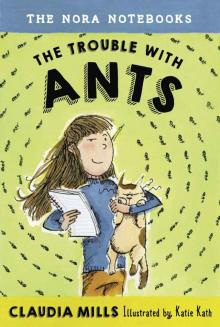 The Nora Notebooks, Book 1: The Trouble with Ants
The Nora Notebooks, Book 1: The Trouble with Ants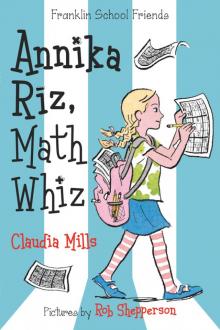 Annika Riz, Math Whiz
Annika Riz, Math Whiz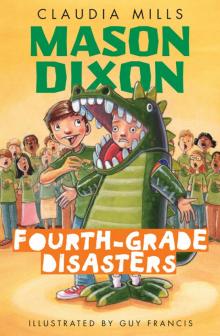 Fourth-Grade Disasters
Fourth-Grade Disasters Pet Disasters
Pet Disasters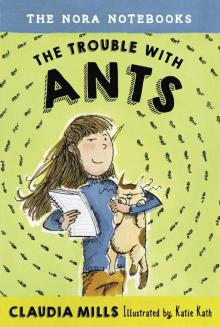 The Trouble with Ants
The Trouble with Ants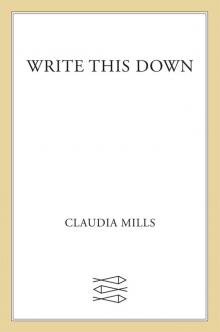 Write This Down
Write This Down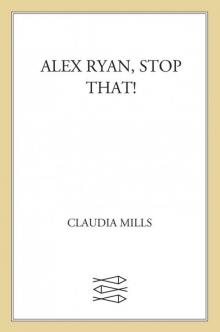 Alex Ryan, Stop That!
Alex Ryan, Stop That!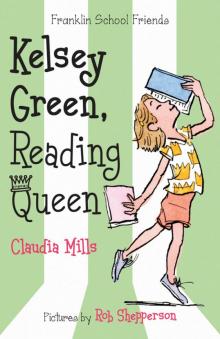 Kelsey Green, Reading Queen
Kelsey Green, Reading Queen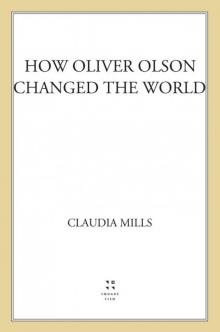 How Oliver Olson Changed the World
How Oliver Olson Changed the World Lizzie At Last
Lizzie At Last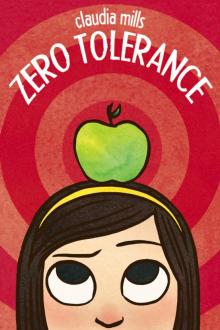 Zero Tolerance
Zero Tolerance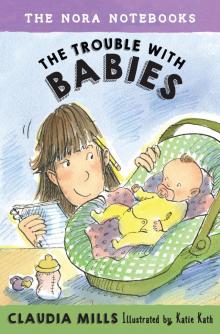 The Nora Notebooks, Book 2
The Nora Notebooks, Book 2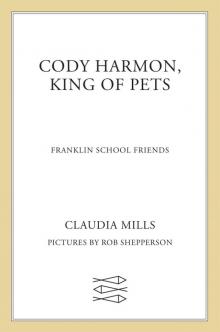 Cody Harmon, King of Pets
Cody Harmon, King of Pets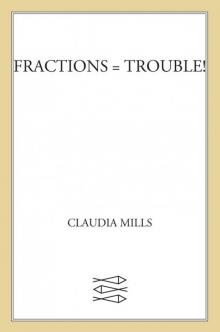 Fractions = Trouble!
Fractions = Trouble!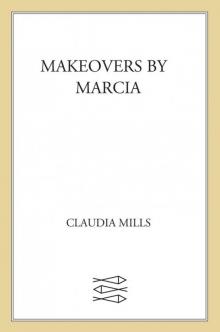 Makeovers by Marcia
Makeovers by Marcia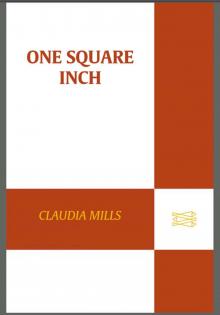 One Square Inch
One Square Inch